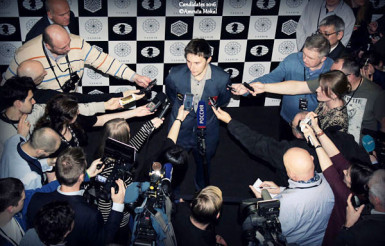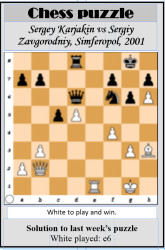Russia cemented its ascent and influence in chess last week, after more than a decade by realizing a challenger for the approaching November world chess championship title match. Russian grandmaster Sergey Karjakin emerged victorious in the 14-round double round-robin 2016 Candidates contest and thereby qualified as the accredited challenger for Norway’s world champion Magnus Carlsen. Karjakin led for most of the competition until a fog of uncertainty descended on a settled winner.
 Things begun to get hazy in the eleventh round when Vishy Anand seemingly thwarted Karjakin’s intentions of moving further ahead in the tournament by beating him with vivacity in a 70 move Ruy Lopez game. It stimulated Kasparov to say “Anand simply outclassed Karjakin.” The ending turned out to be the finest endgame of the competition, a work of art for the Indian grandmaster. Anand snatched the lead temporarily bringing satisfaction to a cool one billion chess fans in India alone, sharing it with the American grandmaster Fabiano Caruana, but enjoying it only for a day. In the twelfth round, Karjakin was back on top with his defeat of Bulgaria’s Veselin Topalov. Anand lost to Nakamura. In the final 14th round shootout game, Karjakin and Caruana clashed in a winner-take-all encounter.
Things begun to get hazy in the eleventh round when Vishy Anand seemingly thwarted Karjakin’s intentions of moving further ahead in the tournament by beating him with vivacity in a 70 move Ruy Lopez game. It stimulated Kasparov to say “Anand simply outclassed Karjakin.” The ending turned out to be the finest endgame of the competition, a work of art for the Indian grandmaster. Anand snatched the lead temporarily bringing satisfaction to a cool one billion chess fans in India alone, sharing it with the American grandmaster Fabiano Caruana, but enjoying it only for a day. In the twelfth round, Karjakin was back on top with his defeat of Bulgaria’s Veselin Topalov. Anand lost to Nakamura. In the final 14th round shootout game, Karjakin and Caruana clashed in a winner-take-all encounter.

The Russian grandmaster won, playing the white pieces in a thrilling 42-move Sicilian Rauzer defence game. Karjakin’s loss to Anand was his only defeat of the competition. Finally, one should recall the work of Karjakin’s second Vladimir Potkin in consummating his victory. It was splendid and should be recognized. Caruana, the column’s favourite to win, played an impressive tournament losing only to Karjakin. Their first encounter in the competition ended in a draw. To qualify to face Carlsen, he had to win against Karjakin. The enormous drama and the ensuing tension were pulsating. The American grandmaster inevitably cracked against his worthwhile Russian counterpart and thus lost the glory of playing for the title.
Who is Sergey Karjakin [pronounced Kar-yak-in] the player who qualified to compete with Carlsen for the world chess championship title? A popular belief is that prodigies exist only in mathematics, music and chess. If such a contention is accurate, Karjakin announced himself to the world as a child chess prodigy. In 2002, Karjakin caused quite a stir within the chess public when he became the world’s youngest grandmaster at age 12 years, seven months, a record which still stands today. At age 11, Karjakin defeated grandmaster Pavel Elanjov in the 2001 Ukranian Team Championship from a level endgame! With masterful precision, Karjakin beat Alexei Shirov, an accomplished grandmaster at 12. And how did Karjakin grind down the reigning world champion Vladimir Kramnik in 2004 in an opposite coloured bishop ending in the Dortmund playoff aged just 14? These three instances would serve as an introduction to the new challenger, who wishes to capture chess’s Holy Grail.
 The time has arrived to reflect on the Carlsen-Karjakin 12-game world championship match happening in New York in November.
The time has arrived to reflect on the Carlsen-Karjakin 12-game world championship match happening in New York in November.
Both contestants were born in 1990, and both have victories against each other. Naturally, Carlsen has the advantage because he played for the title previously. Following his win in the Candidates, Karjakin’s FIDE rating has been elevated to 2779.2 still 72 points behind Carlsen, or about 59%-41% in Carlsen’s favour. And the FIDE rating promises to be a compulsory factor in world championship matches. Getting prepared for the match promises to be crucial for the challenger given Carlsen’s huge extra experience in world championship match play.
Chess games
The four games listed hereunder were played at the Candidates Chess Tournament in Moscow.
White: Sergey Karjakin
Black: Fabiano Caruana
1.e4 c5 2.Nf3 Nc6 3.d4 cxd4 4.Nxd4 Nf6 5.Nc3 d6 6.Bg5 e6 7.Qd2 a6 8.O-O-O Bd7 9.f4 h6 10.Bh4 b5 11.Bxf6 gxf6 12.f5 Qb6 13.fxe6 fxe6 14.Nxc6 Qxc6 15.Bd3 h5 16.Kb1 b4 17.Ne2 Qc5 18.Rhf1 Bh6 19.Qe1 a5 20.b3 Rg8 21.g3 Ke7 22.Bc4 Be3 23.Rf3 Rg4 24.Qf1 Rf8 25.Nf4 Bxf4 26.Rxf4 a4 27.bxa4 Bxa4 28.Qd3 Bc6 29.Bb3 Rg5 30.e5 Rxe5 31.Rc4 Rd5 32.Qe2 Qb6 33.Rh4 Re5 34.Qd3 Bg2 35.Rd4 d5 36.Qd2 Re4 37.Rxd5 exd5 38.Qxd5 Qc7 39.Qf5 Rf7 40.Bxf7 Qe5 41.Rd7+ Kf8 42.Rd8+ 1-0.
White: Anish Giri
Black: Veselin Topalov
1. d4 Nf6 2. c4 e6 3. g3 d5 4. Bg2 Be7 5. Nf3 O-O 6. Nc3 dxc4 7. Ne5 c5 8. dxc5 Qxd1+ 9. Nxd1 Bxc5 10. Nc3 Nc6 11. Nxc4 Rd8 12. Be3 Bxe3 13. Nxe3 Rb8 14. f4 e5 15. f5 Nd4 16. g4 b6 17. Rc1 Bb7 18. Bxb7 Rxb7 19. Kf2 h6 20. h4 g5 21. fxg6 fxg6 22. Rhg1 Ne6 23. g5 hxg5 24. hxg5 Nh7 25. Ne4 Kg7 26. Rc6 Nd4 27. Rc3 Ne6 28. Rc6 Nd4 29. Rc3 Ne6 1/2-1/2.
White: Peter Svidler
Black: Viswanathan Anand
1. c4 e5 2. Nc3 Nf6 3. Nf3 Nc6 4. g3 Bb4 5. Bg2 O-O 6. O-O Re8 7. Ne1 d6 8. Nc2 Bc5 9. Rb1 a5 10. a3 Be6 11. d3 d5 12. cxd5 Nxd5 13. Ne3 Nce7 14. Ncxd5 Nxd5 15. Nc4 Bd6 16. d4 exd4 17. Nxd6 Qxd6 18. Qxd4 Qe7 19. e4 c5 20. Qd1 Nc7 21. Be3 b6 22. f4 Rad8 23. Qc2 Bd5 24. Rbe1 Bxe4 25. Bxc5 Bxc2 26. Bxe7 Rd7 27. Bh4 Rxe1 28. Rxe1 f6 29. g4 Nd5 30. Bg3 f5 31. gxf5 Nf6 32. Bf2 Rd6 33. Re6 Rd1+ 34. Re1 Rd6 35. Re6 1/2-1/2.
White: Anish Giri
Black: Levon Aronian
1. d4 Nf6 2. c4 e6 3. Nf3 d5 4. Nc3 Be7 5. Bf4 O-O 6. e3 Nbd7 7. c5 c6 8. h3 b6 9. b4 a5 10. a3 h6 11. Bd3 Ba6 12. O-O Qc8 13. Rb1 axb4 14. axb4 Bxd3 15. Qxd3 Qb7 16. Rfc1 Rfc8 17. Ne1 Bd8 18. Qd1 Bc7 19. Nd3 Bxf4 20. exf4 Ne4 21. Ne2 Ra2 22. Rc2 Rca8 23. f3 Rxc2 24. Qxc2 Nef6 25. b5 Rc8 26. Qa4 Qc7 27. bxc6 Qxc6 28. Qxc6 Rxc6 29. Rc1 Rc7 30. Nc3 bxc5 31. dxc5 Ne8 32. Nb5 Rc8 33. Kf2 Nc7 34. Nxc7 Rxc7 35. Ke3 Kf8 36. Kd4 Nb8 37. Nb4 Rb7 38. Kc3 Ke7 39. Ra1 Kd7 40. Nd3 f6 41. Ra8 Kc6 42. h4 Kb5 43. Ra1 Nc6 44. Rb1+ Ka6 45. Re1 Re7 46. Ra1+ Kb7 47. Nb4 g5 48. fxg5 fxg5 49. h5 Rf7 50. Ra6 Nxb4 51. Rb6+ Kc8 52. Rxb4 Rf4 53. Rxf4 gxf4 54. Kd4 Kd7 55. Ke5 Kc6 56. Kxf4 Kxc5 57. g4 Kd6 58. Ke3 e5 59. g5 Ke7 60. g6 Kf6 61. Kd3 e4+ 62. fxe4 dxe4+ 63. Kxe4 Kg7 64. Kf5 Kg8 65. Kf6 Kf8 1/2-1/2.







